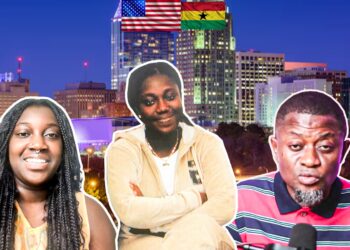Ghanaian Nurse Rachael Shares Her Journey Studying and Living in the United States
Rachael, a Ghanaian nurse based in the United States, shared her experience of moving abroad through the F1 student visa on SVTV Africa’s Daily Hustle Worldwide show. Her story sheds light on the challenges many international students face balancing education, family, and career aspirations in America.
Rachael explained that she traveled to the U.S. on an F1 student visa, which only allows international students to work a maximum of 20 hours per week on campus.
“I got pregnant shortly after arriving, and I didn’t know anyone in the U.S. My husband, however, knew someone in Oklahoma, so I joined him there. I could have changed schools, but I decided to stay and have my baby,” she said.
Life in the U.S. was initially challenging for Rachael, especially since she didn’t have strong networks or local guidance.
“Most of the Ghanaians I met were new or hadn’t gone to school yet, so I didn’t understand the system well,” she recalled.
In 2024, Rachael’s husband joined her officially through an F2 dependent visa. Together, they rented an apartment in February 2024, and he later obtained a work authorization permit to support her education and living expenses. Rachael completed her two-year nursing program in July 2025 and has since been searching for job opportunities.
“I’ve sent over 50 job applications, but most of them require recommendations or endorsements,” she explained.
Now preparing to sit for her NCLEX nursing licensing exams, Rachael hopes to relocate from Oklahoma to the East Coast, where she believes there are more opportunities for nurses.
“Once I get my license, it’ll be under the New York Board of Nursing, so I plan to move to Maryland, New York, or New Jersey. I’m hoping Ghanaians working in hospitals there can recommend me so I can secure a job and get my work authorization processed.”
According to Rachael, life in Oklahoma can be difficult for immigrants seeking professional growth.
“Without a work permit, the American dream is very hard to achieve here. You might know people in Ghana, but in America, what really helps is an endorsement. You need the right people to refer you.”
She also advised prospective students to research thoroughly before choosing schools in the U.S.:
“I was so excited to come that I didn’t research enough. I didn’t check transportation systems or living costs. I used Uber to go to school, and it was very expensive. Even getting Ghanaian food ingredients like pepper was difficult. You have to find out where Ghanaians live and how many affordable schools are available.”
Rachael also warned about exploitation by some agencies that recruit healthcare workers:
“Some companies prefer to bring in their own workers from abroad because they benefit financially. When you’re already in the U.S., they might not want to work with you.”
Despite the hurdles, Rachael remains hopeful. She plans to move to a different city, secure a hospital job, and balance work with family life.
“Once I start working, my husband will take care of our child so I can focus on my career. It’s been tough, but I believe with determination and the right support, my American dream will come true.”

















